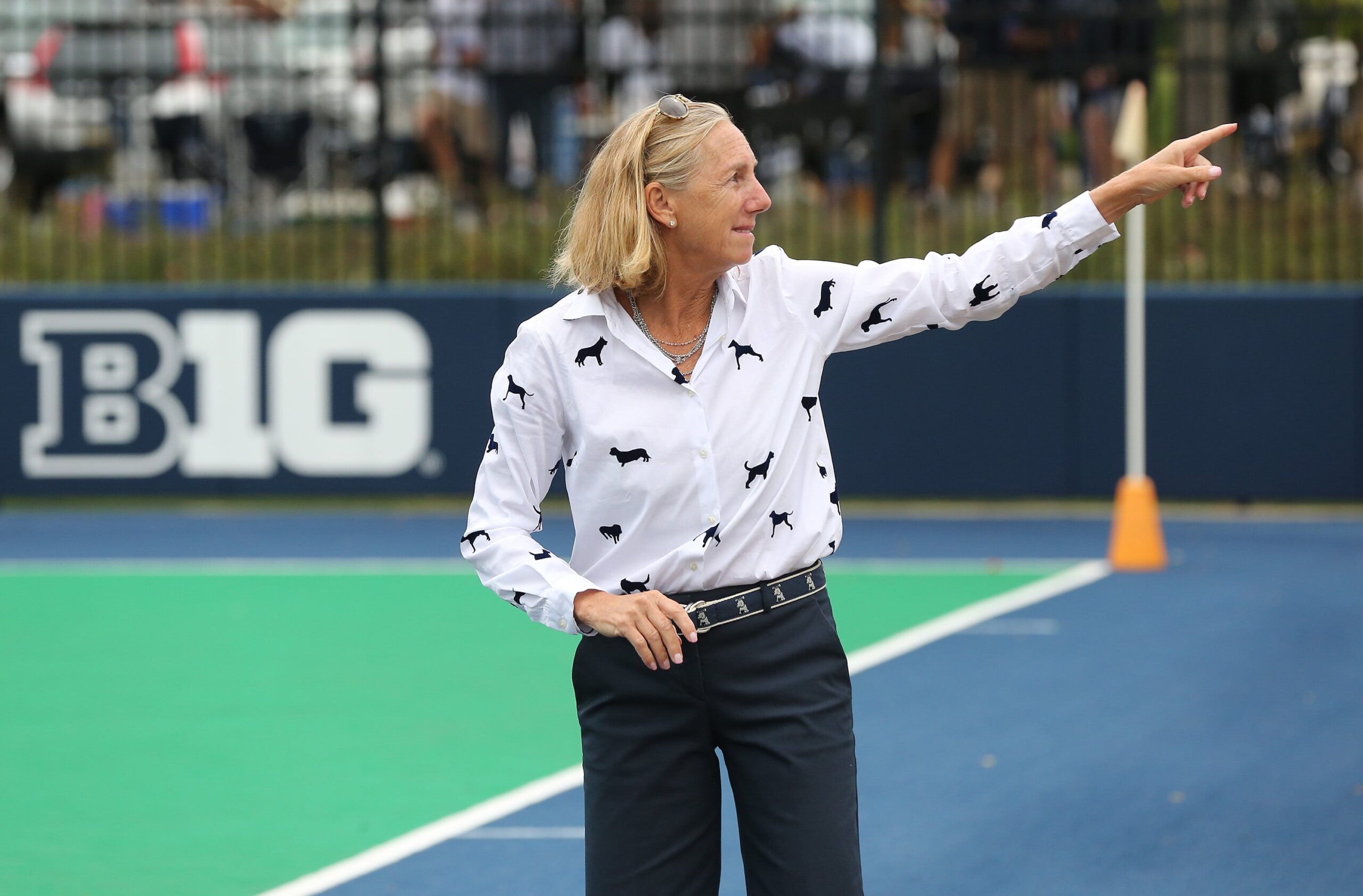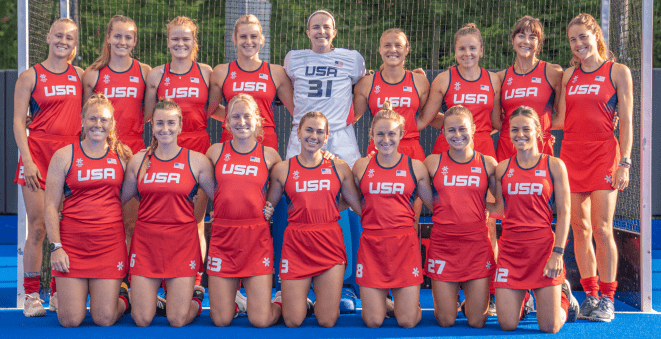Charlene Morett-Curtiss is a tough, confident woman.
And tough confident women can make others either feel uncomfortable or great. That’s generally the norm for anyone who possesses those gifts.
Morett-Curtiss, of Pennsylvania, was the head Penn State field hockey coach until early 2023. Last season was the first Fall that her assistant coach, Lisa Love, took over.
While she might not be calling the shots from the sidelines anymore, she is the driving force behind a new Penn State initiative called ‘Teammates For Life.’ Morett-Curtiss is the longest-serving Penn State field hockey coach, a three-time All-American Penn State field hockey player, a 1984 Olympic bronze medalist, and was part of the USA Women’s National Team.
Her story of how she became an indomitable female coach, who could make even some of the most poised NCAA Division I umpires question their calls, is anchored in family.
“I started in Delaware County,” she said. “One of seven. My five brothers became competitive at an early age. We played whatever the boys were playing. We played everything in junior high. Field hockey was my sport. The boys didn’t play it. I took a lot of great pride in playing field hockey. I had great coaches.”
She was the sixth sibling and no one before her had gone to college. Title IX – the landmark federal civil rights law in the United States that was enacted as part of the Education Amendments prohibiting sex-based discrimination in any school or any other education program that receives funding from the federal government – had recently passed in 1972, around the time her curiosity about going to college was piqued. She aspired to attend college, and if possible, play field hockey, too.
One summer she participated in a sports camp held in the Poconos. When she returned home, she was surprised to receive a phone call from Penn State.
“The coach at Penn State reached out to me and said they were interested in offering me a scholarship,” Morett-Curtiss said. “It’s the first year that they were going to offer scholarships.”

Photo: Char Morett-Curtiss is pictured with the USA Women’s National Field Hockey Team that won bronze in 1984, USA Field Hockey
She and her parents drove to Penn State. Before she went into the meeting, she told her mom, “No, no I’m intimidated. I don’t know what to say to her.”
The meeting obviously went better than she had anticipated. Penn State welcomed her to its family. When she left for school, she said she remembers her dad giving her three $20 bills and saying, “we’ll see you at Thanksgiving.”
The Nittany Lion’s field hockey schedule back in the 1970s included West Chester, Ursinus, and Temple. Morett-Curtiss hoped her family could see her in action.
“They had an opportunity to see me play,” she said. “We were playing at Ursinus my freshman year. I got on the bus and forgot my field hockey stick. We didn’t have extra sticks back then. Somehow, I got to a pay phone and had them bring one of my sticks to the field. You couldn’t text your parents back then.”
As Morett-Curtiss was finding out more about herself and what she could accomplish as a female athlete, at a time when males dominated sports, USA Field Hockey had established a pipeline to the women’s national team to have an Olympic presence.
“After my sophomore year at Penn State, we had C, B, and A camps,” she said. “I made the US team in 1977. In 1978, we went with the US team to England. It was a four-week tournament all over England. We played the biggest match at Wembley Stadium. There were 100,000 screaming schoolgirls. The umpires had to use a horn as a whistle. They were singing the whole time. We were winning 2-0 and somehow, they had two strokes toward the end of the game. They had an English umpire. After the game we had to go to the Queen’s jubilee. We had to get dressed in gowns. We didn’t go there happy. We felt that we were somewhat cheated out of the game.”
The late 1970s and early 1980s were a time when sports were thrust into the spotlight of United States diplomacy.
“We were just getting started with training,” Morett-Curtiss said. “And, the next week, we were talking about a boycott. Sadly, at the end of April, Beth Anders came down the hall and had tears in her eyes. She said, ‘we’re not going. [President Jimmy] Carter just called for the boycott.’”
According to the United States Department of State, “In 1980, the United States led a boycott of the Summer Olympic Games in Moscow to protest the late 1979 Soviet invasion of Afghanistan. In total, 65 nations refused to participate in the games, whereas 80 countries sent athletes to compete.”
“It was devastating,” she said. “I was at Penn State. I would lift in the boys’ weight room. Women didn’t really weight train then. My trainer was a man. He gave me a big hug and we were both crying. He said, ‘let’s go.’ I said, ‘where are we going?’ He said, ‘we’re going to the gym and get you ready for 1984.’”
Four decades ago, for a woman in the United States to go to the Olympics, it was a race against the odds. Not just in training but also for trying to pay for it. Morett-Curtiss was a Pepsi taste tester, she drove cars for tennis players, and ushered at concerts.
“It was crazy,” she said. “We weren’t paid. We had two weeks of opportunity to make some money. And, then we went around the world. The pride to travel around the world; your teammates became your best friends. We went to Argentina, Holland, Germany, Hong Kong, Maylasia.”
Competing against the best around the globe was humbling, she said. It was a lesson in humility and cultural differences.
“We’d go to the club house in Holland, and they come up to you and say, ‘you were not so good today,’” she said.
When she looks back, Morett-Curtiss said she felt “fortunate.” The team she worked with knew they were fit, but they also knew they weren’t viewed as the “most skilled.”
“Back then, there was no dream team,” she said. “We were at the Olympics. When we went to the dining hall, you saw everyone. Baseball players, swimmers, they lived on your floor.”
Locked in Morett-Curtiss’s memory is a moment at the opening ceremonies of the 1984 Los Angeles Olympic Games when she was entering the Coliseum.
“There were 100,000 people,” she said. “People were turning and walking around the track, and I saw my mother and my brother. I never would have imagined seeing them. That was special. My family could rent a house in LA, so they could watch all the games, which was really cool.”
As a side note, Morett-Curtiss added, “They were sitting with the cast of Dynasty.”
“Back then, you could never dream of going to the Olympics for field hockey,” she said. “They had it for men, but they didn’t for women. That’s why it was such a big deal. This was something we could work toward. Today’s world is so different with NIL and the transfer portal.”
USA tied Australia in the third-place match. The United States went on to claim its only medal in women’s field hockey history at the LA games, which went down to overtime and penalty strokes.
Penn State
The Nittany Lions hired Morett-Curtiss in 1987.
“I think we were in the Atlantic-10 at the time,” she said. “I was hired to just coach field hockey. It was great that I could just focus on the one sport. We had turf in 1987. We could train at Penn State.”
Morett-Curtiss said it was thanks to the late Penn State Football Coach Joe Paterno that field hockey had facilities. And, those facilities were used by USA Field Hockey for its camps.
“Penn State did it because they thought it was the right thing to do,” she said. “There’s still so much more to accomplish. We had beautiful facilities. Our coach had us train in kilts. We had practice kilts, thick wool vests. A lot of the credit went to Joe Paterno. He was about team and students getting an education. Tim Curley, the athletic director, he played football. And, they just always made sure that really it wasn’t that just football players or soccer players were getting anything bigger and better on campus. What they started to see is these programs were getting more at other schools. Paterno would say, ‘we’re going to buy a lot of field hockey sticks.’
“Football has become a whole different animal now in so many different ways. It started to take that turn to a different place in the mid-90s. The bowl money, the Big 10 became a big conference in 1992. That provided a whole different landscape because now we’re traveling to the Midwest and that’s what Penn State did.”

Photo: Char Morett-Curtiss coaching, Penn State Athletics
Penn State field hockey moved into the Big 10 in 1992.
“We were one of the first sports to start in the Big 10, and first to win a Big 10 Championship,” Morett-Curtiss said. “Now there’s so much power in the Big 10 in so many sports – basketball, volleyball. I think to have that participation in sport and that competitiveness growing up is something I learned at an early age. If the guys were getting something then we were going to get it, too. You had to fight for it. I wanted to play on astroturf, the football practice field. Joe would say, ‘yea, you can play on the field. That’s going to make you better.’ The visibility of women’s sports, it’s amazing and it’s outstanding. When I look back, I was at a great school, where they took care of their female athletes.”
Going from fighting for field space to her last year coaching and traveling by chartered flights to NCAA Division I tournament games shows the commitment Penn State is making to women in sports, she said.
Keeping it going
Morett-Curtiss’s personal philosophy on coaching was to try to offer her players a life balance. She said they play better when breaks are taken, and rest and relaxation are part of the equation.
But, there are moments when coaches can try too hard to make the athletes who they want them to become, she said. After the COVID-19 pandemic, she said she felt like everyone was becoming “disconnected.”

Photo: Char Morett-Curtiss and PSU Field Hockey assistant coaches, Penn State Athletics
“We need to reconnect with each other,” she said. “The leaders on campus, other women, who have gone on to do great things for Penn State. It’s not a four-year experience, it’s a lifetime journey. I want to get the word out and talk about coaching. Talk about my experience. Build a place where we can get more women empowered.”
Morett-Curtiss said Love had been by her side for 29 years as her assistant. And, that she believes in her ideas for the team. She said she knew it was time to move forward to offer her expertise in a different way, which is how she got Teammates For Life started.
“Our culture at Penn State is what makes us special,” she said. “When I’ve not been able to win that national championship, I never felt it’s too bad we didn’t win that game. I wanted to get us back to the Final Four. I left the program in a great place. The people running it are doing an outstanding job. They are going to put their own footprint on it, and the program is highly respected.”
Thank you for reading Female Athlete News. Email us with a story idea or news tip to [email protected].




